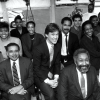When Viola Osgood began writing for the Boston Globe 55 years ago, she faced a difficult and dismissive work environment as one of the few Black women working in a newsroom. Despite this adversity, Osgood used her intelligence and fierce spirit to become a pioneering reporter, opinion writer and mentor to those around her.
Viola Osgood passed away on April 23rd in Chestnut Hill, leaving behind a powerful legacy for reporters of color who came after her. Another pioneering Black woman in Boston media, Carmen Fields, a friend and former colleague of Osgood's at the Boston Globe, spoke with All Things Considered guest host Judie Yuill. Fields is an Emmy Award-winning broadcast news journalist who once co-anchored GBH's 10:00 News and now hosts the show Higher Ground. This transcript has been lightly edited.
Yuill: First, we want to offer our condolences for your loss.
Fields: Thank you very much.
Yuill: Tell us how you came to know Viola.
Fields: Well, I joined the Boston Globe, I believe it was 1972 or so, and at the time, the only Black face in the globe was that of Viola Osgood. So, quite naturally, I made my way to her to help me figure out which way was up, so to speak. Our very first encounters, I can't say, were particularly warm and welcoming. She could be very, very stern and made it very clear to me early on that I was to speak to her when I was spoken to, and that startled me. But as days and weeks and time went on, I discovered that her tough exterior really masked a very tender hearted, warm interior.
Yuill: So, she came to become a friend and you earned her trust?
Fields: Without a question. [She was] a helpful person, because she had been at the Globe longer than me and she had the benefit of knowing more people there and also having been in the Boston area longer than me. So, it was just helpful in providing guidance and help and assistance that any beginning reporter needs in trying to figure out who to call when and how, because heaven forbid that I have to ask an editor, "Can you explain that again?" or say, "I don't understand." So, she was at a very important ally in that sense.
Yuill: That's really priceless to have somebody like that in the newsroom. How was she able to navigate the newsroom so that she could cover hard news stories and really just get the respect and the opportunities that she deserved?
Fields: Well, that's a good question. I would imagine, like all of us, by doing a good job with whatever we were handed and going beyond the call of duty. She was a very skillful writer. She was a very resourceful reporter and that's what you needed to go along and to get along.
Yuill: What were some of the most impactful moments of her career?
Fields: Two things come to mind for me. We were both a part of the staff that won the Pulitzer Prize for public service for the coverage of school desegregation in Boston. So, we all basked in that glory. And she was on the education beat, I believe. At that time, I was a general assignment reporter. But of course, the whole house of the Globe poured [over] the coverage and storytelling of what was happening with the students of Boston into that effort. It was a very momentous and exciting time to receive the recognition from the Pulitzer Organization.
I think the other instance that I am particularly proud of being a part of was by all was the coverage in the late seventies of some murders of six Black women that we felt had been just kind of overlooked and not taken particularly seriously in the same vein as deaths of white women or murders of white women was taken at the time. So Viola, myself, and another Black woman, Gail Pollard, who's now in Los Angeles, took it upon ourselves and pitched the idea of really putting a face to the names that had been in the paper and that had been ignored and make a better story of that. I forget how many weeks that we worked. We divided the names up and went to work, and whenever I faced a roadblock, we were having trouble finding somebody or not quite sure if I had the right person, just miraculously, like Abracadabra, Viola would come in and put a phone number on top of my desk, or someone would call me and say that Viola suggested that they call. And so the story came together, I think it was two parts, maybe three parts. Gail, myself and Viola were particularly proud of that effort.
Yuill: Many people are saying that Viola mentored them. How did she lift up reporters of color?
Fields: Just by being there and answering any questions and providing either solace or support. She was also a willing listener, and there were times she invited some of us into her home and to be a part of activities that she was experiencing, the weddings of her children, the holiday gatherings. She was warm. And I think that that kind of southern hospitality came out. When you're in a community that's unfamiliar, I don't care what color you are and the traditions are different and alien, a warm face, a hand of friendship, is always welcome and Viola provided that.
Yuill: While there's more diversity and inclusion in Boston's news media, what would you like to see that we haven't had yet?
Fields: Well, continue to diversify the voices and bases of media and continue to lift up the stories that are not the major headlines of the day. If it bleeds, it leads, but there are other the stories that go below the radar screen that aren't told and that are very compelling. I don't mean to imply that [we need] more soft stories, although that can be a part of it, but there are other issues beyond murders and mayhem that we see in the news. I would like to see news and programing be more representative of the wide variety of issues and incidents that affect all of our lives.









